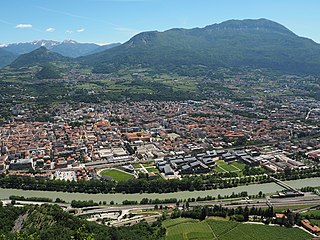
Trento, known in English as Trent, is a city on the Adige River in Trentino-Alto Adige/Südtirol in Italy. It is the capital of the autonomous province of Trento. In the 16th century, the city was the location of the Council of Trent. Formerly part of Austria and Austria-Hungary, it was annexed by Italy in 1919. With 118,142 inhabitants, Trento is the third largest city in the Alps and second largest in the historical region of Tyrol.

Caproni, also known as Società de Agostini e Caproni and Società Caproni e Comitti, was an Italian aircraft manufacturer. Its main base of operations was at Taliedo, near Linate Airport, on the outskirts of Milan.
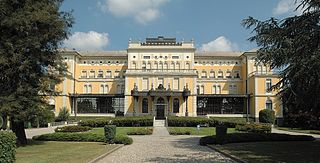
Vizzola Ticino is a village and comune of the province of Varese in Lombardy, Italy. It is on the banks of the Ticino River, immediately to the west of Strada Provinciale 52 on the western perimeter of Malpensa Airport.

The Caproni Ca.60 Transaereo, often referred to as the Noviplano (nine-wing) or Capronissimo, was the prototype of a large nine-wing flying boat intended to become a 100-passenger transatlantic airliner. It featured eight engines and three sets of triple wings.
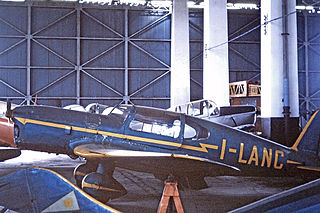
The Ambrosini SAI.2S was a four-seat light aircraft produced in Italy shortly before World War II.
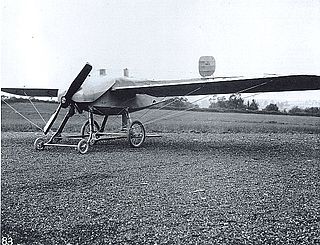
The Bristol Coanda Monoplanes were a series of monoplane trainers designed by the Romanian designer Henri Coandă for the British company British and Colonial Aeroplane Company.

The Caproni Ca.1 was an experimental biplane built in Italy in 1910. It was the first aircraft to be designed and built by aviation pioneer Gianni Caproni, although he had previously collaborated with Henri Coandă on sailplane designs.
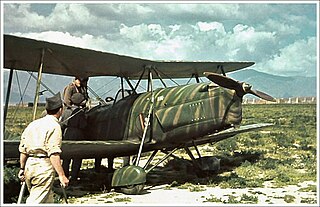
The Caproni Ca.164 was a training biplane produced in Italy shortly prior to World War II. It was a largely conventional biplane intended as a follow-on to the Ca.100 and sharing that aircraft's layout with a slightly smaller upper wing.
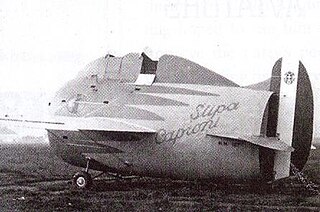
The Stipa-Caproni, also known as the Caproni Stipa, was an experimental Italian aircraft designed in 1932 by Luigi Stipa (1900–1992) and built by Caproni. It featured a hollow, barrel-shaped fuselage with the engine and propeller completely enclosed by the fuselage—in essence, the whole fuselage was a single ducted fan. Although the Regia Aeronautica was not interested in pursuing development of the Stipa-Caproni, its design influenced the development of jet propulsion.

Giovanni Battista Caproni, 1st Count of Taliedo, known as "Gianni" Caproni, was an Italian aeronautical engineer, civil engineer, electrical engineer, and aircraft designer who founded the Caproni aircraft-manufacturing company.

The Caproni Trento F.5 was a small Italian two-seat trainer designed by Stelio Frati and built by Aeroplani Caproni Trento. The F.5 was not ordered into production and only a prototype was built.

The Gianni Caproni Museum of Aeronautics is Italy's oldest aviation museum, as well as the country's oldest corporate museum. It was established in 1927 as the Caproni Museum by Italian aviation pioneer and aeronautical engineer, Giovanni Battista "Gianni" Caproni and his wife, Timina Guasti Caproni.

The Caproni Ca.193 was an Italian liaison and air-taxi aircraft that was offered to the Italian Air Force as an instrument flight trainer and to the Navy for liaison. Design work started in 1945 and only the prototype was built. It was the last aircraft the Caproni company designed and built in Milan.

The Caproni Ca.9 was a single-engine monoplane designed and built by Caproni in the early 1910s.

The Caproni Ca.6 was a single-engine biplane designed and built by Caproni in the early 1910s.

The Caproni Ca.8 was a single-seat monoplane designed and built by Caproni in the early 1910s.

The Caproni Ca.13 was a two-seater single-engine monoplane built by Caproni in the early 1910s.

The Caproni Ca.105 was a multirole high wing single engine monoplane developed by the Italian aeronautical company Aeronautica Caproni in the late 1920s.
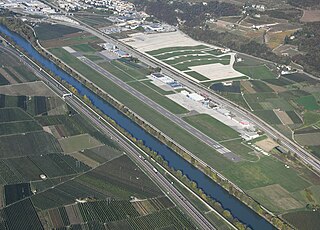
Trento-Mattarello Airport, also known as Aeroporto G.Caproni, is an airfield located at Trentino, 3.4 NM south of Trento, Italy.

The Macchi M.20 was a single-engine biplane trainer aircraft produced by the Italian aeronautical company Aeronautica Macchi between the end of the 1910s and the beginning of the 1920s.




















